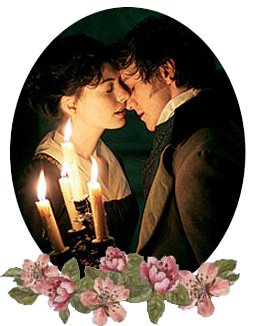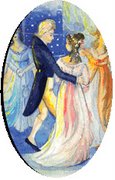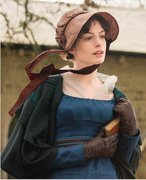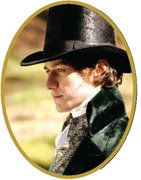Michelle’s collections of BJ reviews
 I would like to thank Michelle for providing me this great article, and also sorry for the delay, been extra busy than usual lately (the findings of Anthony Lefroy did nothing to reduce my schedule, of course!). Please visit the links to see the entire reviews, for I only put the excerpts here.
I would like to thank Michelle for providing me this great article, and also sorry for the delay, been extra busy than usual lately (the findings of Anthony Lefroy did nothing to reduce my schedule, of course!). Please visit the links to see the entire reviews, for I only put the excerpts here.
True Romance: Jane Austen herself would approve of this sad love story, by Maryann Johanson, Charleston City Paper.
OK, I know it's not real. I know it's a bit of speculation wildly spun out of, like, one mention made in, like, one letter that Austen flirted with this Lefroy guy — but so what? So what if it's a fantasy, a "fictional biography"? Didn't Austen write fantasy, too? Don't her books end up with all the deserving young women married to generous and worthy husbands? Austen herself knew how unlikely that was.
I love Becoming Jane even if it is almost entirely invented, because it captures both the aching romanticism and the cold, hard practicalities of Austen's fiction. And in a way, it even does Austen one better: it's laden with all of the angst and heartbreak and tears we've come to expect from a Sense & Sensibility or a Pride & Prejudice, but because it is adhering to the spirit of Austen's life — she never married, never enjoyed any kind of long-term romantic entanglements that posterity is aware of — it doesn't indulge in a happy ending. How can it? Spoiler alert! Anne Hathaway's charming and independent Jane does not end up happily ever after with James McAvoy's handsome and roguish lawyer Tom Lefroy. But I've "spoiled" the movie only for those who aren't familiar with Austen or her work, and I promise the movie works far better as a "fictional biography" — an enrapturing, spirited one with the foreknowledge of her bittersweet yet independent, unmarried life — than it does as a silly sitcom that hangs on the fulfillment of romantic dreams. Becoming Jane is too heartfelt to be dismissed as that.
…
I keep coming back to one scene, mid-film, when Jane has finally realized that, gods yes, she wants Tom. She's at a ball that she thinks he might be at, too, and she keeps glancing around for him while she twirls unhappily on the dance floor, hoping to see him, needing to see him. And director Julian Jarrold (who made the wonderful Kinky Boots) lets the suspense build and build — will she see him? is he there? — until suddenly, he is there, at her side, dancing around her, and the ache on both their faces is so extraordinary that it made me burst into tears. It's a perfect moment, full of longing and love and the total attainment of that pining, which must, inevitably — if you know Jane's story — be lost. I burst into tears, because, like Jane, like many of us, I've tasted that, and lost that, too.
And that's what makes Becoming Jane so just-right. It recognizes the dream and recognizes how unattainable it often is.
I think Jane herself would approve.
“Gracefully Austen”; Excerpts from James Stanford’s review:
…Utilizing a lovely British accent and a graceful way with words, Hathaway communicates Austen's predicament beautifully. When she was creating her immortal heroines, such as Elizabeth Bennet of "Pride and Prejudice" and Elinor and Marianne Dashwood of "Sense and Sensibility," the real Jane Austen must have pictured someone like Hathaway, with skin like milk in the moonlight and hazel eyes that sparkle with expectation, hopefulness and perhaps the faintest hint of lustiness when she looks at Lefroy.
McAvoy brings out the tug-of-war going on in Lefroy's mind between the pursuit of pleasure and the desire to please his benefactor, a prickly judge (Ian Richardson) who looks for opportunities to disapprove. As Lady Gresham, who has long been accustomed to being a puppet master and has no desire to relinquish the job, Smith is the embodiment of supreme snobbiness.
Director Julian Jarrold gives "Jane" a mellow, suitably unhurried pace that fits the story's setting and allows ample time to understand the characters and the codes of the culture they inhabit. Men are permitted to have their fun (Lefroy and a friend cool off after a cricket game by skinnydipping in the river), while women are expected to be models of decorum and demureness. Step out of line or fail to hold your tongue, and you risk becoming "tainted with suspicion," which is the next best thing to being shunned.
Austen may have challenged the rules, but the movie also shows her abiding by them. Even when her novels win her admirers who seek her out at parties, Austen shyly requests that she be allowed to retain her anonymity
Celebrities passing up a chance to toot their own horns? That's so 18th century.”
Anne Hathaway glows in period drama, by Masha Savtiz
Four out of Five stars
From the church podium at Sunday services, Jane's father Reverend Austen warns the women in his congregation, "A profound mind should be kept a profound secret."
Fortunately neither Jane nor director Julian Jarrold heeds this advice.
Becoming Jane is a beautifully imagined portrait of the aspiring writer in 1795 as she embarks on a life/career that will herald her as one of the great novelists of all time.
Anne Hathaway ( The Devil Wears Prada ) is luminous on screen as the 20-year-old Jane Austen. We watch her grapple with art, passion, and loyalty as distant relative Tom Lefroy, played by James McAvoy (The Last King of Scotland ), is sent to spend time with her family deep in the English countryside to temper his insolent and wily ways.
The sharp-witted dialogue and attraction that ensues between Tom, the sophisticated law student, and Jane portends the romantic escapades and sagas that Austen is renown for in later works such as Pride and Prejudice and Sense and Sensibility.
This romantic period-piece drama set in 18th century
Though there is a bit too much "drama" in the drama, Becoming Jane is a well–made film and a well-told story. It examines the sacrifices in staying true to one's dreams, and making peace with the consequence of our choices.
Mississippi’s Clarion-Leger gives “Becoming Jane” four stars:
"Will all your stories have happy endings?" a suitor inquires of young writer-to-be Jane Austen in "Becoming Jane."
Of course, we know the answer. Pretty much so, yes, with weddings and young ladies of "no money, no importance" marrying well by the final page.
But that was the fantasy that Jane Austen (Anne Hathaway) created for her world. A pretty young woman of no property and few prospects in early 19th-century Britain, she went on to write half a dozen of the finest novels ever written in English - lovely, aching, witty romances full of agonizing longing, class consciousness and withering put-downs.
And she couldn't have done it without that one heartbreak she had on her way to "Becoming Jane."
Anne Hathaway stars as the youngest daughter of a parson (James Cromwell) and his worrywart wife (Julie Walters). She has an older brother in the army and an older sister (Anna Maxwell Martin) engaged to an army chaplain.
The Austens of Hampshire are people of quality, not cash.
That's why Jane's prospect, the only heir (Laurence Fox) to wealthy Lady Gresham (Maggie Smith, of course), holds such promise. To her mother, that is.
"The man's a booby," dad whispers. Jane agrees.
"You know our situation, Jane," her mother hisses.
The girl still wants to marry for love.
…
And celebrate the glories of British character actors, especially
Great art, the cliche goes, emerges from great suffering, so even if you don't know Austen's life story, you have an idea what to expect. And if you know her timeless novels and the glorious films made from them, it's great to get a sense of what shaped her, of what made Jane so becoming.
Pic 1: Mrs. Austen and Jane, from www.annie-hathaway.com
Pic 2: Jane and Tom dancing, from www.james-mcavoy.net
Pic 4: Jane, Eliza and Henry, from www.annie-hathaway.com
Pic 5: Jane and Tom, from www.james-mcavoy.net
















































3 comments:
I love Maryann Johanson's review. Beautifully put and just what I would have said.
I agree, Tina. Maryann's review is touching. Actually, all Michelle's collection is on the spot. I just read again Savtiz' review here:
Though there is a bit too much "drama" in the drama, Becoming Jane is a well–made film and a well-told story. It examines the sacrifices in staying true to one's dreams, and making peace with the consequence of our choices.
In the light of the recent discovery that Tom very likely went back to Ireland in November 1798 to save his brother and his family, I see it now in Tom's POV a well. He has been making peace with the consequences of his choice: leaving Jane for Mary.
I can understand him better recently, and Savtiz's words have made me realise it again. Tom Lefroy... faced his own ghosts, and came to terms with them.
I agree with you completely Tina; Maryann was so in line with my feelings in her review. I love the line:
"It recognizes the dream and recognizes how unattainable it often is."
Very poignant
Post a Comment